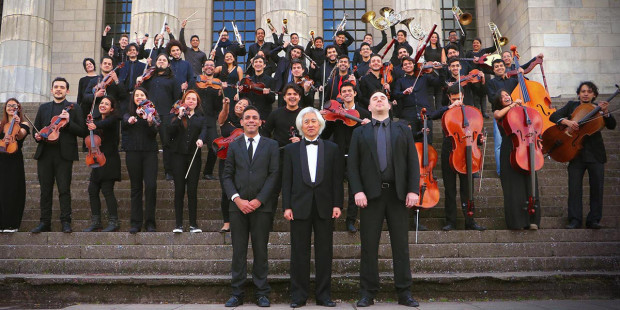
The lights of the theater go down, the first violin of the La and the other musicians refine the instrument, their most precious treasure that they took care of during long journeys of travel throughout South America, from Venezuela to Argentina.
It is the Latin Vox Machine, an orchestra of Venezuelan academic musicians emigrated to Argentina who gave their first concert in a theater in Buenos Aires and for two hours felt they returned home.
“This orchestra is special, because when we play together it’s like we’re in Venezuela for a moment again, it’s that energy that floods the whole place when we’re playing together, we all come from the same house, we’re all brothers, I think that influences a lot when playing, “said cellist Verónica Rodríguez, 22 years old.
He left Venezuela at the end of 2017 due to the serious crisis in his country. I had plans to go to Paris, where I had already been shortlisted for a conservatory, but the money did not reach.
Encouraged by a musician friend, she crossed overland from Maracay, in the center-north of Venezuela, to Manaus, in Brazil, where she took a plane to Buenos Aires.
When he arrived, he began to work taking care of the elderly, but now he is teaching music at a school.
Formed in the famous and celebrated system of children’s and youth orchestras of Venezuela, most came to Buenos Aires in the last year and began playing in the subway to make a living.
The System, awarded in 2008 with the Prince of Asturias Prize, was created by the late maestro José Antonio Abreu in the 1970s, a time of oil bonanza for Venezuela, and since then has trained hundreds of thousands of children and young people in classical music.
“You changed my day”
In the Jujuy station on the E line of the metro, Fedosky Suárez plays Antonio Vivaldi with the violin and his partner César Pérez, on the other side of the track, answers him with the bassoon. The passengers burst into applause and leave tickets in the case. “Che, you changed my day,” said one.
It is becoming more common to witness these concerts in the metro, where until recently the tango and rock musicians predominated.
“There was a time when I started listening to very high quality musicians on the subway,” he told AFP news agency Omar Zambrano, organizer and founder of the Latin Vox Machine, recalling how he began to approach them to discover that they were, like him. , newly arrived Venezuelans.
Then, “we started to get together, to gather, to see what happened, how many there were, and there were many of them … We came up with the idea of making an orchestra,” explained the 36-year-old who studied piano but devoted himself to audiovisual production .
A goal and a mission
In that exploration they met with the South Korean conductor Jooyong Ahn. Of 66 years, he had made his career in the United States and with his wife he settled two years ago in Buenos Aires. One day they showed him recordings of the young Venezuelan musicians and the crush occurred.
“All of them are incredible musicians, and to get these young musicians to become professionals is my goal and my mission”, said the one who has been an ad honorem director for one year and wants to form an orchestra with them that does not depend on state funds.
For the first concert on October 9 at the Teatro del Globo in Buenos Aires, donations and solidarity were part of the key, according to Zambrano. At the end of the concert he could not contain the emotion. “I am deeply moved because you are no longer you and you are a group of people with the same mission and the same motive, which is making music and art and continuing to transform lives,” he said.
The most valuable
Jaime Nieto, 34, tightens the case in which he keeps the flute and the pícolo. He left six months ago from the city of San Juan de Colón, in the Venezuelan Andes, where he ran a children’s orchestra.
He had previously been in Buenos Aires, and as a child he gave a concert at the Teatro Colón next to the now acclaimed Venezuelan director Gustavo Dudamel.
“The instrument is for us one of the most valuable things. (On the trip) the passport and the instrument were the most important thing, it is an extension of us and with our life we would have taken care of it.” I knew that I was coming to make music. I achieved it and I am very happy for that, “said the young man who teaches the winds of an orchestra of the City.
“We do not want to be a ghetto”
The orchestra is open. Jocelyn Zambrano, a 32-year-old violinist, arrived just a month and a half ago in Buenos Aires, where she makes pastry. But he also played in that first concert of the Teatro del Globo.
In total there are 90 musicians, of which three are Argentines (double bass), one Chilean (oboe) and one Colombian (trombone).
“We want to get our space, integrating the Argentines, we do not want to be a ghetto,” said Zambrano. And Jooyong supports you. “I would like to unite the Venezuelan culture with the Argentine culture and make a unique orchestra,” he said.
The flute player Nieto sees it as a round trip: “We never imagined that we were going to go, but this is going to be a growth for us and for all of Venezuela, Venezuelans will one day return and bring the good that they collected” , he promised.
With information from the AFP agency







